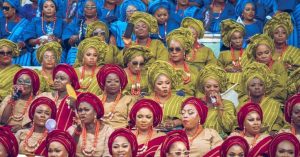
The Nigerian government’s recent signing of a $150 billion trade agreement with the European Union, known as the “Samoa Agreement,” has stirred controversy due to concerns over its implications for LGBT rights.
The Samoa Agreement, signed on June 28, 2024, but revealed to the public this week by Minister of Budget and Economic Planning Atiku Bagudu, succeeds the Cotonou Agreement. The deal, involving 79 member states of the Organisation of African, Caribbean, and Pacific States (OACPS), aims to address global challenges such as climate change, ocean governance, and peace and security.
The agreement’s disclosure has sparked significant backlash online, primarily over fears that it may recognize Lesbian, Gay, Bisexual, and Transgender (LGBT) rights, a stance contrary to Nigeria’s laws. In 2014, then-President Goodluck Jonathan signed a bill outlawing same-sex marriages and relationships, making LGBT activities illegal in Nigeria.
Former lawmaker Shehu Sani criticized the agreement on social media, urging African nations to reject any foreign assistance tied to conditions against local cultural and religious values. “All African countries, including Nigeria, who appended their signatures should go back and ‘unsign’ the Samoa agreement,” Sani posted on X.
Abubakar Akande of the Nigerian Supreme Council for Islamic Affairs (NSCIA) echoed these sentiments, asserting that the agreement contradicts Nigeria’s moral and religious principles. The Peoples Redemption Party (PRP) also called for Nigeria to withdraw from the agreement, branding it a betrayal of the nation’s values.
Amid the uproar, Bagudu’s spokesperson, Bolaji Adebiyi, clarified that the agreement focuses solely on economic development, with no mention of LGBT or same-sex marriage. “What Bagudu signed was about a $150 billion trade component,” he said.
Presidential spokesperson Bayo Onanuga and Minister of Information and National Orientation Mohammed Idris both reaffirmed that the agreement does not contravene Nigerian laws. Idris emphasized that extensive reviews ensured that the Samoa Agreement aligns with the 1999 Constitution and other Nigerian laws. He added, “Nigeria’s endorsement was accompanied by a Statement of Declaration… clarifying that any provision inconsistent with the laws of Nigeria shall be invalid.”
The European Parliament’s review indicated that initial drafts of the agreement included LGBT provisions, but these were replaced with a commitment to gender equality after member states raised objections. Article 2, clause 5 of the final agreement states, “The parties shall systematically promote a gender perspective and ensure that gender equality is mainstreamed across all policies.”
This clarification comes as Nigeria balances its commitment to international partnerships with adherence to its national laws and cultural values.







